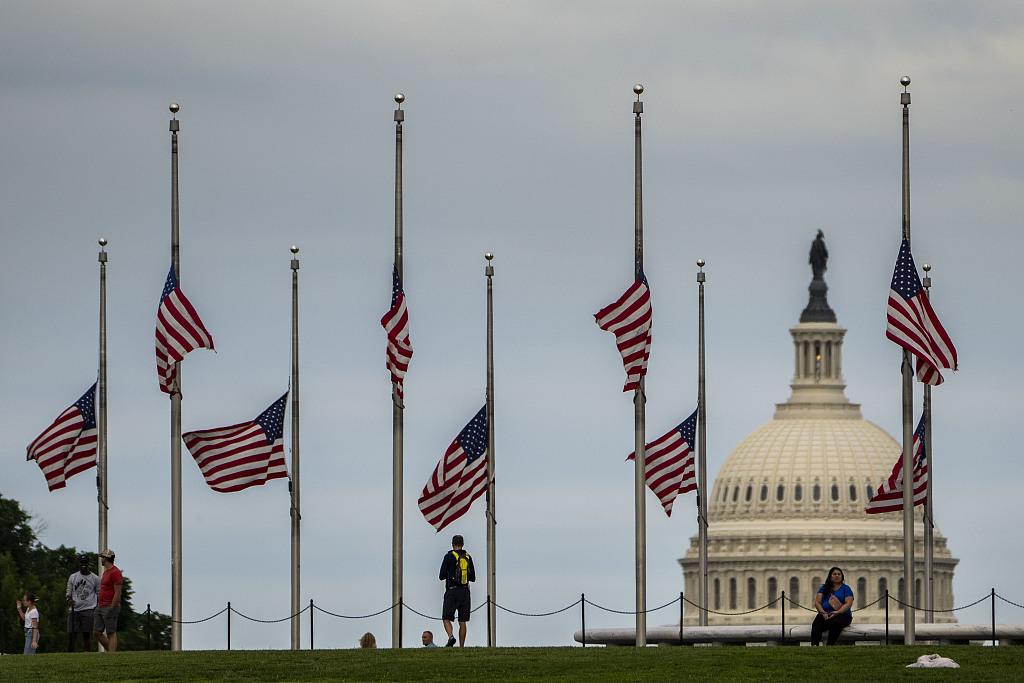The meaning behind rising suicide rate in US
- By Mitchell Blatt
 0 Comment(s)
0 Comment(s) Print
Print E-mail China.org.cn, June 28, 2023
E-mail China.org.cn, June 28, 2023

American flags are seen at half-staff surrounding the Washington Monument as people enjoy the weather on the National Mall in Washington D.C. on May 25, 2022. [Photo/VCG]
"The most extraordinary scene in the whole of 9/11 is the firemen arriving at the tower and opening an elevator. The people inside, escaping, look annoyed. For everyone else, the world had changed. For them, it was still an ordinary day full of ordinary bullshit, such as being stuck in elevators."
– Stephen Marche, Author of The Next Civil War
I read Stephen Marche's thought-provoking 2018 article in Foreign Policy titled "Al Qaeda Won" on this summer day, and I have come to think Marche hit on a number of points that explain many crises America is facing as a nation.
Marche's core argument is about the power of "diathetics," T.E. Lawrence's (of "Lawrence of Arabia" fame) word for a kind of information warfare. The goal of diathetics is not to consciously persuade the target audience but to manipulate the thinking of the target. A very successful diathetics campaign would be able to turn the target's core self-ideal against itself. "Confusion is its purpose," Marche wrote.
At its most basic level, Al Qaeda's attacks against the United States of America succeeded on September 11, 2001, by grabbing America's and the world's attention and scaring Americans. It made Americans live in fear and shift all resources towards addressing terrorism – to the detriment of Americans' civil liberties and quality of life – even though the risk of terrorist attacks remained low.
The event of "9/11," as far as most people remember it, was created by the mass media. It was experienced on television. Two thousand people dying at once in a fiery explosion is more exciting than 48,000 Americans shooting themselves in the head with a handgun in 48,000 separate events they conclude quietly away from the cameras. The media interpretation of an event is how most people experience an event.
Since then, our access to media has expanded exponentially, and the media we consume now is mostly online, including large doses of social media toxins. The lack of verification, the extremist views of corporate CEOs like Elon Musk, and the "always online" nature of Twitter and Facebook incentivize the spread of identity politics and culture wars nonsense.
In the post-Cold War era of the United States, culture and society is perceived as having less and less meaning. People live in sprawling suburban neighborhoods disconnected from other people, from businesses, and from activities. Robert Putnam documented the decline of civic engagement in his book "Bowling Alone." We experience life by scrolling, playing video games, and, if Apple succeeds with its new VR-driven project, through a headset.
A people's conception of who they are and what their place is in the world is shaped by the stories the media tells. In the long era after World War II, the U.S. was telling itself we were the most powerful nation in the world. We were the leaders of the Free World. The fall of the Soviet Union deprived us of an enemy, as senior Soviet advisor Georgi Arbatov said. It deprived us of meaning.
America is about defending freedom. From whom?
Al Qaeda seemed to have answered that question. We had a new enemy. But then President Bush attacked Iraq. Then the U.S. failed to bring democracy to Iraq or Afghanistan. The visions of America proffered by Western films as this undefeatable superpower were rendered false. Meanwhile, it wasn't foreign terrorists who were shooting up our schools and malls or rioting at the Capitol to try to overthrow our own democracy.
Factories were closing. Knowledge workers were stuck in make-work jobs shuffling papers, sending emails, and creating vapid things of questionable value. People's actual lives were suffering.
America lost the self-image that existed in the collective head and didn't have much tangible or spiritual meaning to replace it with.
There's so much rage, and now it is directed against internal enemies: attacks on LGBT people, on women, on racial minorities, and on people we disagree with.
The General Social Survey has been collected every year since 1972. The results showed that from 1973 through around 1990, Americans expressed general happiness at a level of about 2.24-out-of-3 (3 being the happiest). Since then, the happiness score has declined most years and sits at 2.16 as of 2015. That trend is in line with a similar decline found in the World Happiness Report. CNN reported that happiness declined yet further during the pandemic.
The suicide rate has shown a similar trend. Fewer people are happy; more people are ending their own lives. After declining from 1986 until the late 1990s, the rate of suicides per 100,000 Americans increased from 10 to 14. It kept rising yet higher during the pandemic.
The effects of the pandemic, of course, are at the forefront of many people's analysis of this trend. And the pandemic certainly exacerbated unhappiness for people who were already feeling melancholy and created unhappiness for many who were not. But the pandemic did not cause the sense of national ennui that had been existing for years before.
Mitchell Blatt is a columnist with China.org.cn. For more information please visit:
http://m.keyanhelp.cn/opinion/MitchellBlatt.htm
Opinion articles reflect the views of their authors, not necessarily those of China.org.cn.





